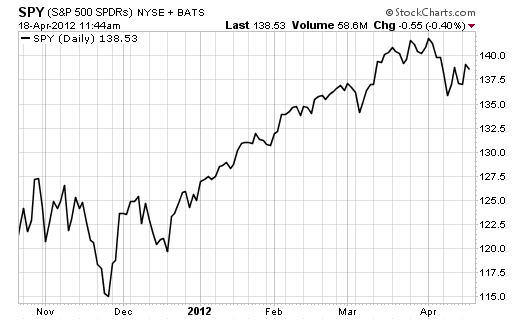You’ve probably heard the anecdote that the average goldfish has a memory of just 30 seconds. It makes sense for a goldfish. 30 seconds worth of memory is probably all a goldfish needs.
And though men are not goldfish, and obviously require (and have) more than 30 seconds of memory, it seems as though the average investor has a woefully inadequate memory.
I’d peg the average investor’s memory at six months, max. I’m not saying that people forget things that happened six months ago – only that the average investor seems to care about what has happened in the past six months – or what is likely to happen in the next six months.
I’ve explained this tendency in the past by pointing out the successful investment strategy of waiting for six months after a tragedy to reap the rewards of investing in the sector affected by the tragedy.
Had you bought shares of Exxon-Mobil (NYSE: XOM) immediately after the Valdez oil spill, you only had to wait just over six months before the stock made new sustained highs. It hasn’t breached the post-Valdez lows since.
Likewise, buying BP (NYSE: BP) immediately after the Deepwater Horizon spill paid off in to the tune of better than 50% gains in about six months.
The market cares – for sure. But only for about six months, and then it’s as if nothing happened.
And while you can use this short-term memory handicap to your advantage – to wait for a crisis or a catastrophe to pounce on hated or misunderstood assets at low prices – you should also be aware that the market’s six month memory can hurt you.
Today, the market’s participants only know six months of perpetual success and growth. They’re like a goldfish that just finished a delicious meal of fish food less than 30 seconds ago.
But here are the facts – the market is much more expensive on balance than it was six months ago. If you were feeling cautious and concerned about the state of this market back then, you should probably feel more cautious and concerned now.
The past six months of gains came easily, and they will likely go easily.
The United States and Europe are still trying to finagle their debts with inflationary money policy. Some of that easy money policy is hitting the stock market – hence the huge gains we’ve seen over the past few years.
And while they’re likely to continue to try to inflate their way out of this sovereign debt crisis, it’s likely that the bulk of investors will not be made richer from these efforts, but rather, significantly poorer.
In order to avoid becoming significantly poorer – and hopefully somewhat richer – you need a longer memory than 6 months. And you probably need a bit of luck – but more importantly, you need to give your portfolio access to assets that are outside of the reach of central bankers and politicians.
Unfortunately, I can’t say what those assets are with a total degree of confidence. Governments around the world have seized assets of every stripe in the past, and there’s every indication that they will do so again.
But the closer and more liquid your assets are, the more likely they are to be there when you need them. I prefer to hold gold, silver and several forms of currency close to my person. I also prefer to keep mental trailing stops on all of my stock positions.
That leaves me with a good amount of liquidity in my accounts – and ensures that I’m ready to pounce on the next crisis opportunity in the market.
Be nimble. Get physical. And don’t be fooled by the market’s 6 month memory.
 Facebook
Facebook
 Twitter
Twitter
